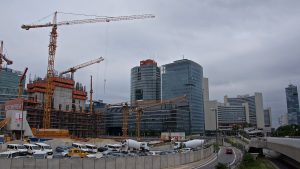The Georgetown Coalition for Workers’ Rights, a group of students, graduate workers, and staff advocating for improved treatment of Georgetown’s workers, held a teach-in for the community about issues affecting campus workers on March 21. The virtual teach-in highlighted low working hours and potential exposure to COVID-19 as problems that the university must address.
The coalition released a series of demands for Georgetown to improve working conditions during the pandemic on Feb. 23. While the university responded to the demands—which include a suspension of the Redeploy Georgetown policy and the provision of adequate personal protective equipment during the pandemic—the coalition said Georgetown did not address their concerns adequately or agree to any of the demands.
Since the onset of the COVID-19 pandemic, many Georgetown employees have faced reductions in their hours that make it difficult to meet their financial needs, according to the coalition.
“The problem is that all these workers, who live in one of the most expensive areas in the country, are only getting half the hours,” coalition member Leo Rassieur (COL ’23) said at the teach-in. “The compensation is a starvation wage. It’s definitely not a living wage or a just wage.”
Georgetown maintains a Just Employment Policy, which claims to provide a living hourly wage to employees. The policy has been adjusted over time to account for increases in the cost of living and stands at $17.28 an hour as of February 2020. The coalition argues that a focus on the wage itself is deceptive, however, as many workers during the pandemic are not given enough hours for their total wages to cover their cost of living.
The coalition also criticized the university’s Redeploy Georgetown program, which reassigns staff members to fill health service roles during the pandemic. Workers selected for the program are given a choice between accepting these new roles, where they could be at a higher risk for exposure to COVID-19, or be placed on unpaid leave, according to Redeployed staff.
The threat of being placed on unpaid leave, the coalition argued, forced workers to take healthcare roles for which they were neither comfortable nor trained. “When you’re on unpaid leave, you can’t look for a new job, you can’t apply for unemployment benefits, and you don’t have any access to workplace healthcare,” Nirvana Khan (SFS ’24), another coalition member, said at the teach-in
Khan also argued that the program disproportionately impacted workers from marginalized communities. “When we’re thinking about the people who have been given this choice, it’s obviously not DeGioia,” she said. “It’s ‘low-level staff,’ and of course those staff are disproportionately women of color.”
According to a university spokesperson, Georgetown has started a Redeploy Georgetown Professional Development Fund that offers $500 grants to all Redeployed employees. While the university does not have its own COVID-19 vaccine doses, over 40 Redeployed employees have been vaccinated within vaccination clinics organized by Georgetown University in collaboration with the city’s Department of Health.
“While COVID-19 has created financial pressure for institutions of higher education, Georgetown has utilized a creative solution to avoid the COVID-related layoffs, mandatory furloughs or salary reductions that many universities have utilized,” a university spokesperson wrote in an email to the Voice.
The coalition also argued that Georgetown’s treatment of its workers also violates the Just Employment Policy’s promise of a “safe and harassment-free” working environment. During the Fall 2020 semester, the university could have done more to enforce safety measures such as social distancing and student mask compliance in Leo J O’Donovan Dining Hall, coalition member Kariel Bennett (COL ’23) said during the teach-in.
“Though there are now implementations of safety measures, there are still more things we can do, and this only took place after weeks of us being in school and after several students had complained,” she said.
Georgetown also provides little aid for workers hired by the dining management company Aramark, the coalition argues. Aramark, one of the largest food service providers in the U.S., employs workers in Georgetown’s dining facilities. While Georgetown cannot directly manage Aramark employees, the coalition argued that the university can influence the company’s policy. For instance, Georgetown already requires that Aramark pay its employees in accordance with the Just Employment Policy.
While other staff members can apply to the GUCares Employee Emergency Fund, which gives employees access to grants of up to $1,000 to cover emergency expenses, Aramark employees cannot. The coalition criticized Aramark employees’ lack of access to emergency funds for creating a second class of workers.
“Georgetown pretends that Aramark workers, the workers that you see every day at Leo’s, live in a whole different world,” Rassieur said during the teach-in. “There are some people who are part of the Georgetown family, and then there are these other people that we don’t know, we don’t see, and we don’t care what happens to them.”






